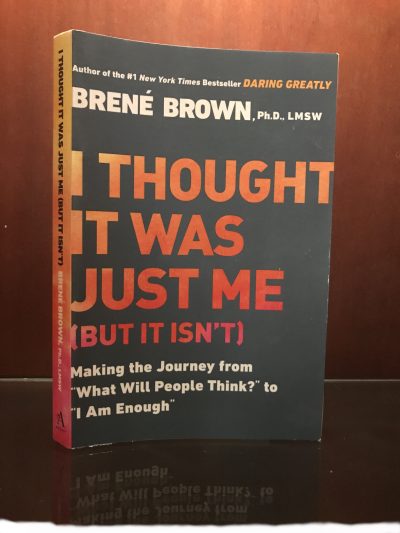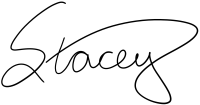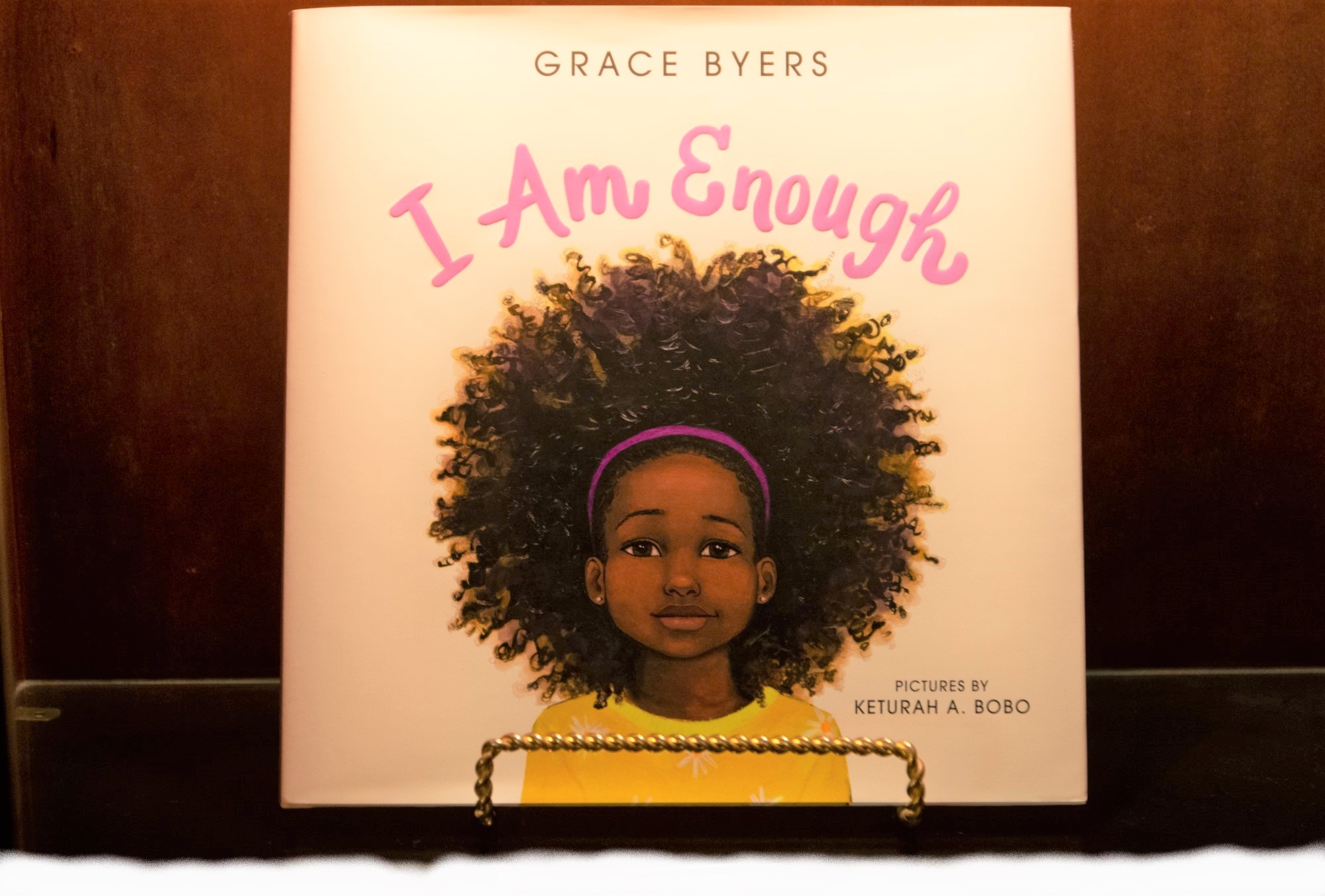Book Review:
I Thought It Was Just Me (but it isn’t)
by Brené Brown

14 October 2019 | Theme: Enoughness | 6-Minute Read | Listen
Unless you’ve been living under a rock, you’ve probably at least heard of Brené Brown. Her TED talk “Listening to Shame” has had over 11 million views, and she has published nearly a dozen books on shame, empathy, vulnerability, and connection. But because I, well… had been living under a rock, I hadn’t heard of her until my best friend Cristi gave me I Thought It Was Just Me for Christmas a couple of years ago.
I had told Cristi about the experiences I’d had in my inner-personal work of facing down Not-Enoughness, and I had shown her the poem I shared here earlier this month. Enoughness had become my personal theme in December 2017. I think the reason she bought me the Brené Brown book was its full title, I Thought It Was Just Me (but it isn’t): Making the Journey from “What Will People Think” to “I Am Enough.” Interestingly, the book has appeared with several subtitles, including Women Reclaiming Power and Courage in a Culture of Shame and Telling the Truth About Perfectionism, Inadequacy and Power, but the reprint with “I Am Enough” on the cover was what grabbed Cristi’s attention.
Then, because sometimes I just really have to be walloped over the head to begin to pay attention, she gave me a second Brené Brown book for my birthday a couple of weeks later. And I thanked her and put both books on my nightstand, fully intending to read them, but not quite making the time to do so. Really, I can be so oblivious! My best friend of 45 years had given me two books that would rock my world, but I set them aside.
Months later, I was binge-watching Elizabeth Gilbert videos on YouTube when the interview between Gilbert and Brené Brown popped up. “Wait a second,” I thought, “I’ve heard of her. Isn’t she the one who wrote those books I’ve been dusting but haven’t cracked yet?” Duh.
Let me just put it out there: Brené Brown is a genius. She has spent most of her professional life researching a topic few others are willing to touch: shame. Then she gets real with her readers to relate her findings—she drops the mantle of academia to write and speak about shame with humor and humility. In talking and writing about vulnerability, she allows herself to be vulnerable. When she says we need to share our shame stories, she tells some of her own.
According to Brown, talking about shame isn’t easy because even to hear another speak of their shame can elicit strong, visceral reactions. It’s a universal emotion—everyone has experienced shame—and yet, nobody talks about it.
What is shame, though, exactly? Brown defines shame as “the intensely painful feeling or experience of believing that we are flawed and therefore unworthy of love and belonging – something we’ve experienced, done, or failed to do makes us unworthy of connection.” In other words, it’s the feeling that we aren’t enough, that other people can see that we aren’t enough, and that they will reject us because of our not-enoughness.
And because human beings are “hard-wired for connection,” the feeling of disconnection is incredibly painful. No wonder nobody wants to talk about it!
But Brené Brown does talk about it, and brilliantly. She tells us that 12 shame categories emerged from her research: appearance and body image, motherhood, family, parenting, money and work, physical and mental health, sex, aging, religion, being stereotyped and labeled, speaking out, and surviving trauma.
For over 90% of the people Brown has interviewed, appearance/body image is a major source of shame. And why wouldn’t it be? Billions and billions of dollars are spent to make women feel less-than so that we’ll buy products that will make us “acceptable.” As a society, we spend far more each year on diet, cosmetics, and clothing than we do on education. We all want belonging, and we’re willing to alter our appearance to fit in.
Each of us has our own particular experiences within these categories, and what’s a shame trigger for one person may not be a trigger for another. But recognizing what does trigger us is absolutely necessary for us to become resilient (notice that I didn’t say immune or resistant, but resilient) to shame.
The thing is, shame only works in the shadows. It lurks deep within us, slithering along the baseboards until something brings up the feeling again, and then it rises up and threatens to overpower us, making us feel small and isolated.
But shame can’t stand being brought into the light of day. When we shine our awareness on it, talk about it, we discover that the terrifying monster was, after all, only a specter.
But if it’s a specter, it’s a persistent one! Brown writes that “as long as connection is critical, the threat of disconnection that leads to shame will also be a part of our lives.” We are all vulnerable to feeling shame, and we can’t armor up against it. What we can do, she teaches us, is to become resilient.
Much of Brown’s work focuses on what it takes to be vulnerable and resilient, and in this book she spends a chapter on each of the four elements of resilience: recognizing shame and understanding our triggers, critical awareness, reaching out, and speaking shame.
As she explores each of these areas, she gives real-life examples of women who have experienced shame and how they bounced back from it, so that we can see how to put the four elements into practical use. Each one of her anecdotes is presented with such heart that the reader feels as if she’s talking with a dear friend who has gone through a painful experience.
Brené Brown is a researcher who doesn’t “sound like a researcher.” Her conversational, down-to-earth style is approachable and, at the same time, profound. Her work has been incredibly powerful for me as I have uncovered the stories I tell myself that keep me small. I’ll be sharing one of those in my next post.
I encourage you, Dear Reader, to spend some time this weekend with Brené Brown, whether it’s by reading one of her books or audiobooks or watching her on YouTube or Netflix. You may just remember, too, that you are Enough.
Until next time,

Resource:
Brown, Brené. I Thought It Was Just Me (but it isn’t): Making the Journey from “What Will People Think?” to “I Am Enough.” New York: Avery, 2007
If you enjoyed this article,
please share on social media!
NEXT ARTICLE

Book Review: I Am Enough by Grace Byers, Illustrated by Keturah A. Bobo
17 October 2019 | Theme: Enoughness | 3-Minute Read